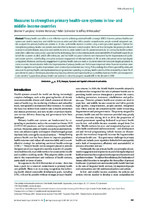Measures to strengthen primary health-care systems in low-and middle-income countries

View/
Date
2020Author
Schneider, Helen
Langlois, Étienne V.
McKenzie, Andrew
Metadata
Show full item recordAbstract
Primary health care offers a cost–effective route to achieving universal health coverage (UHC). However, primary health-care systems are weak in many low-and middle-income countries and often fail to provide comprehensive, people-centred, integrated care. We analysed the primary health-care systems in 20 low-and middle-income countries using a semi-grounded approach. Options for strengthening primary health-care systems were identified by thematic content analysis. We found that: (i) despite the growing burden of noncommunicable disease, many low-and middle-income countries lacked funds for preventive services; (ii) community health workers were often under-resourced, poorly supported and lacked training; (iii) out-of-pocket expenditure exceeded 40% of total health expenditure in half the countries studied, which affected equity; and (iv) health insurance schemes were hampered by the fragmentation of public and private systems, underfunding, corruption and poor engagement of informal workers. In 14 countries, the private sector was largely unregulated. Moreover, community engagement in primary health care was weak in countries where services were largely privatized. In some countries, decentralization led to the fragmentation of primary health care.
